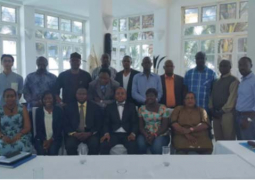Before their declaration, indications were rife that Ecowas leaders would go through with the proposal and agree to limit the tenure of the region’s presidents to no more than two terms.
The proposal, designed to compel elected presidents to serve no longer than two terms in office, was premised on the belief that tenure elongation had over the years, caused a lot of controversy in several African countries.
Most conflicts in Africa have had their roots in political disputes, arising from either parties refusing to accept the results of polls, or attempts by leaders to change the constitution to suit their political ambition, thus resulting in internal strife that often derail progress of member nations with spill-overs to neighbouring states.
Since military rule became unfashionable across most countries in Africa, a few African presidents have attempted to bend the rules or change constitutions to ensure that they stayed in power beyond the terms stipulated by the country’s laws. While in several countries this has been resisted by the citizens, in a few others, the result has been calamitous on the country’s peace and security, as well as on peoples’ safety and wellbeing.
For a fact, it was heart-warming to note that majority of the Ecowas countries desired the proposal to limit presidential tenures, arguing that the measure would ensure participatory democracy and sustainable development in member states.
Had the policy sailed through, West Africa and indeed, Ecowas would have blazed an enviable trail in participatory democratic culture, a prestigious achievement that the regional body could have been proud of as a historic achievement in its 40 years of existence. Without a doubt, it would have been a befitting anniversary present for all citizens of the region.
For now, West Africans must remain hopeful. Though the matter has been put on hold for further consultation, it must be kept alive until Ecowas leaders walk their talk in terms of respect for the protocol on Democracy and Good Governance. After all, it has been proved in instances like Ghana that smooth democratic transitions, periodic free, fair and participatory elections are tangible prerequisites for averting political violence and destabilisation.
Significantly, Ecowas member states must ensure that the dividends of democracy trickle down to the ordinary citizens to prevent avoidable conflicts. Ecowas leaders must also understand that their citizens deserve to have food security, quality healthcare, education, safe water, electricity, roads, transportation and security; that could be guaranteed through political integration desired by all peoples in the region.
As the West African regional bloc celebrates its 40th anniversary, citizens must also be more alert to their duties and responsibilities by exhibiting a higher sense of patriotism and nationalism, necessary to move their countries towards sustainable development and progress. Neither West Africa nor Africa in general can afford to continue to be left behind technologically, industrially or sociologically.
Given the vast natural, material and human resources the region is endowed with, it is time to translate the hopes and dreams of the people of West Africa in to better productivity and leadership, as well as better standard of living and service delivery for the benefit of the citizens, region and indeed, Africa as a whole.
Guest editorial
“Happy Birthday ECOWAS. Life starts at 40.”
The Point


